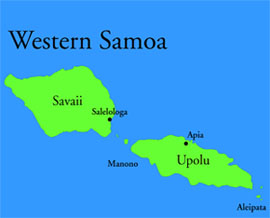Samoa faces up to Paradise Lost after quake, tsunami
 Wellington - The Pacific island state of Samoa, known as a laid back tourist paradise, faces dramatic changes in its way of life following this week's devastating earthquake and tsunami, according to reports from the region on Friday (Thursday local time).
Wellington - The Pacific island state of Samoa, known as a laid back tourist paradise, faces dramatic changes in its way of life following this week's devastating earthquake and tsunami, according to reports from the region on Friday (Thursday local time).
Towering waves caused by the magnitude-8 undersea quake wiped out tourist resorts on the south coast of the main island Upolu, killing at least 115 people and leaving the pristine beach and colourful gardens at the once-beautiful village of Lalomanu a paradise lost.
"Lalomanu is no longer a thriving tourist spot," a reporter wrote in Friday's New Zealand Herald. "Now, it is a rubbish dump."
Radio New Zealand correspondent Leilani Momoisea said the devastation in the village was shocking.
"There's just actually nothing standing save for a few trees," she said. "Complete debris all over the beaches."
She said it was clear the tsunami waves went right up to the mountains, making it very difficult for the villagers to escape. Too vulnerable to outrun the incoming waters, many old people and very young children among the dead, officials said.
Now, Momoisea said, the villagers, who have lived all their lives by the water, are camped out on the mountain, where they used to grow their taro crops and banana trees, and do not want to come down.
"They don't want to live at the beach again - they say they don't want to be reminded of the terrible things that have happened," she said.
"They are very scared. They do not want to come down. They want to stay up there, where they are living under tarpaulins with no power or running water."
Apart from Samoa's death toll, more than 30 people died on neighbouring American Samoa and at least nine on Tonga's Niuatoputapu island.
Thousands of people remained homeless on the islands after houses were swept away by the force of waves, which reportedly reached 6 metres in some places and reached hundreds of metres inland.
International aid has begun to arrive in the stricken region, where authorities said it would take hundreds of millions of dollars and months, if not years, of work to re-establish communities and infrastructure.
Palanitina Toelupe, chief executive of the Samoan Health Ministry, told Radio New Zealand that lack of water and food made the risks of typhoid, dysentery and other diseases very high. (dpa)